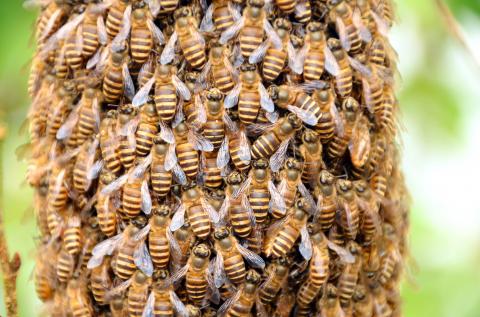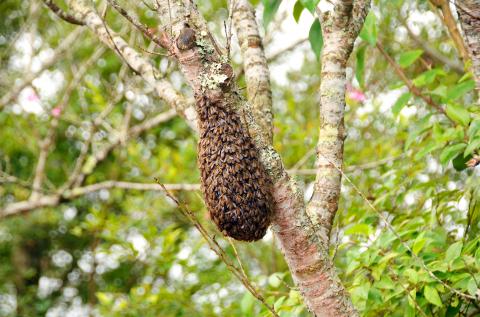Over a thousand honeybees forming an elliptical shape as they gather on a cherry tree instead of staying in a beehive was something that farm owner Tsai Cheng-ming had never seen in the several decades that he has lived on Jinjhen Mountain in Taitung County’s Taimali Township. After observing the bees for nearly two hours, the following day when he went back the bees were nowhere to be found. Tsai Nu-jen, head of Taitung District Agricultural Research and Extension Station’s Department of Crop Environment, says that this is a natural swarming phenomenon among China’s wild honeybees, typically occurring in the spring. It means that the local ecological environment is doing well, he says.
Tsai Cheng-ming, owner of Chingshan Farm on Jinjhen Mountain, says that on the morning of Feb. 23 when he was cleaning up his farm he came across a ball-shaped object on a tree by the side of the road. After walking closer to it, he discovered that it was a swarm of over a thousand bees. The “ball of bees” was squirming around on the 3m-tall cherry tree, approximately 1.5 from the ground, Tsai says, adding that the elliptical shape was about 20cm in diameter.
Tsai Nu-jen says that this particular swarm of honeybees from China was in the middle of swarming. Once a group of honeybees grows large and strong enough, it produces a new queen, he says, adding that the old queen leaves the colony and takes a swarm of bees with her, which gathers on a tree until the swarm is complete. Then it prepares to move to a suitable location to make a new colony, while the old colony is left to the new queen bee. The phenomenon of swarming is most commonly seen in the spring, particularly among wild Chinese honeybees. The so-called ball of bees is only a temporary gathering — a natural phenomenon that should not alarm people. Swarming means that a group of honeybees is gradually getting stronger. Seeing a group of bees swarming in the wild is good news, especially in recent years with increasing numbers of bee colonies disappearing.
(Liberty Times, Translated by Kyle Jeffcoat)

Photo: Wang Hsiu-ting, Liberty Times
照片:自由時報記者王秀亭
上千隻蜜蜂沒在蜂窩裡,卻是聚集在櫻花樹上,形成一團橢圓形蜂球,台東太麻里鄉農園主人蔡政銘說,在金針山生活三、四十年,首見這種情形,觀察了將近兩小時,隔日再看已不見蹤影,台東農業改良場作物環境課長蔡恕仁表示,這是中國野蜂分巢的自然現象,多發生在春天,顯示當地自然生態良好。
金針山青山農園主人蔡政銘表示,二月廿三日上午整理園裡環境時,發現路邊的櫻花樹上有一團球狀物體,走近一看竟是上千隻蜜蜂聚集在一起,「蜂球」附著三公尺高的櫻花樹上蠕動著,離地約一點五公尺,是個長約二十公分的橢圓形球體。
蔡恕仁表示,此一蜂群是中國野蜂正在分巢,每當蜜蜂族群壯大到一定程度,產生新的蜂后時,舊蜂后即會帶走一群蜜蜂,到樹上集結,待集結完成,便準備到下一個適合做巢地點,準備做下一個巢,舊巢就留給新的蜂后;分巢現象常見於春天,特別是中國野蜂,樹上的蜂球只是短暫集結,為一自然現象,民眾不必太過恐慌,分巢顯示蜂群逐漸壯大,特別是近年來蜂群消失時有所聞,野外蜂群有分巢是個好消息。
(自由時報記者王秀亭)

Photo: Wang Hsiu-ting, Liberty Times
照片:自由時報記者王秀亭

US President Donald Trump has renewed his ambition to take control of Greenland for national security reasons and questioned whether Denmark has any legal right to the Arctic island. The debate has revived scrutiny of how Greenland became part of Denmark, its current self-rule and path to independence, and Washington’s military footprint. HOW DID DENMARK GET GREENLAND? Greenland was inhabited by Inuit peoples from Asia and North America intermittently from around 2,500 BC. Around 985 AD, Vikings led by Erik the Red settled in southern Greenland, farming and building churches. Around the same time, ancestors of today’s Inuit arrived, living as hunters

Have you ever gazed at the night sky and felt as though the Moon loomed larger than usual? Your eyes were not deceiving you. The Moon’s apparent size can __1__ subtly depending on where it is in its orbit. On certain occasions, it reaches its fullest phase while at its closest point to Earth. When these two events __2__, scientists and the public refer to the spectacle as a “supermoon.” The Moon does not orbit our planet in a perfect circle. Instead, it travels along a more oval-shaped __3__, completing one full orbit every 27 days. Consequently, there are times when

A: Aside from K-pop, what were the English chart-toppers? B: Billboard’s top three singles for 2025 were “Die with a Smile” by Lady Gaga/Bruno Mars, “Luther” by Kendrick Lamar/SZA and “A Bar Song (Tipsy)” by Shaboozey. Plus, pop diva Mariah Carey’s 1994 megahit “All I Want for Christmas Is You” won its 20th and 21st weeks at No. 1, becoming the longest-running No. 1 song in history. A: How about in Taiwan? The news says nine of the 10 most-streamed songs on Spotify Taiwan were Korean. B: Yup, and the top three were: “Winter Ahead” by BTS’ V and Park

AI-generated summaries are shaking up the media world. Tools like Google’s AI Overviews now provide users with direct answers above the search results, resulting in fewer people clicking on news links. For publishers who rely on that traffic to generate advertising revenue, this shift is hitting hard. The fallout is measurable. Many sites have seen a sharp drop in traffic since AI summary features rolled out. An analysis revealed that a news outlet that had once ranked first on Google lost up to 79% of its traffic when its link appeared beneath an AI-generated summary. Statistics also show that